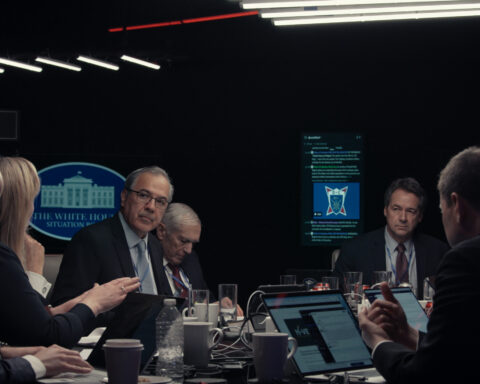Politics, Instructions Manual
(Spain, 115 min.)
Dir. Fernando León de Aranoa
Programme: TIFF Docs (International Premiere)
It’s no secret that left-wing anti-elite populism is in the air: Bernie Sanders in the U.S., Jeremy Corbyn in the U.K., Syriza in Greece and Arvind Kejriwal in Delhi are just a few of its more visible manifestations. Another one is Podemos, a new political party in Spain that made waves with radical democratic sentiment, impressive poll numbers, and victories in local elections soon after its founding. Focusing mainly on back-room debates, machinations and hand wringing, Politics, Instructions Manual follows the tumultuous year-and-a-half leading up to the party’s first general election in December 2015.
The film opens with a large-scale assembly of the young yet already fragmented party. On one side are eventual Secretary General Pablo Iglesias and fast-talking political theorist and strategist Íñigo Errejón trying to turn Podemos into something like a traditional party with conventional leadership; on the other side are Pablo Echenique and others, advocating the more radical position of a leaderless party, where every member makes a contribution to the collective. Predictably, Iglesias triumphs. Significantly, the episode—transfixing in its way due to the built-in drama of political campaigning as well as Birdman -esque drums to make sure our attention never drifts—is also a bit confusing for anybody unfamiliar with the situation. It’s a problem that persists throughout the film.
The question of governance remains an idée fixe for Podemos. In fact, the absence of discussion of almost anything other than the basic structure and mechanics proper for a populist democratic party seems almost to link means with ends, as though rule by the masses is necessarily going to solve the country’s problems. There is no greater rebuttal to this idea than in the party’s crushing loss in the Catalan elections months before the general. In a post-mortem, Iglesias remarks that Podemos never took a stand on the election’s central issue. The film quickly moves past this, but it’s worth dwelling on. What was the central issue? Catalan separatism. Why would a left-wing party ignore it? Because they unquestioningly believe class trumps identity. Needless to say, that does not seem to be the case in Catalonia right now.
The party recovers, though, dramatically rising almost ten points in the last two months of the race en route to a third-place finish in the general election. While this is a rousing finish, I was left wanting more in the way of analysis. There is a brief aside about the party’s roots in the so-called 15-M movement—the anti-austerity protests beginning on May 15, 2011—but neither the protests nor the party’s fiscal position are fleshed out in much detail. Pictures of protestors and other people on the street stand in, unsatisfactorily, for any narrative or analysis around issues of unemployment, migration, welfare cuts, and so on. Just as seriously, the oft raised questions around Podemos allegedly receiving money from repressive regimes—namely Venezuela and Iran—are assumed to be baseless slander and not given any significant investigation. Given the seriousness of the allegations and the fact that a quick Google search turns up many articles over the course of months dealing with the issue, one would have hoped that a documentary about the party would have taken the opportunity to investigate the claims in more detail.
Like An Insignificant Man, also at TIFF, Politics, Instructions Manual is an interesting but flawed take on a contemporary left-wing populist political movement. The strengths and flaws are similar—investigative complexity is sacrificed in favour of the false idols of narrative coherence and propulsive pace. I would have hoped for the opposite, but as documents of an emerging zeitgeist, both films are invaluable nonetheless.
Politics, Instruction Manual screens:
-Sunday, Sept. 18 at 8:30 PM at Cineplex Scotiabank
TIFF runs Sept. 8 – 18. Please visit tiff.net for more information.











